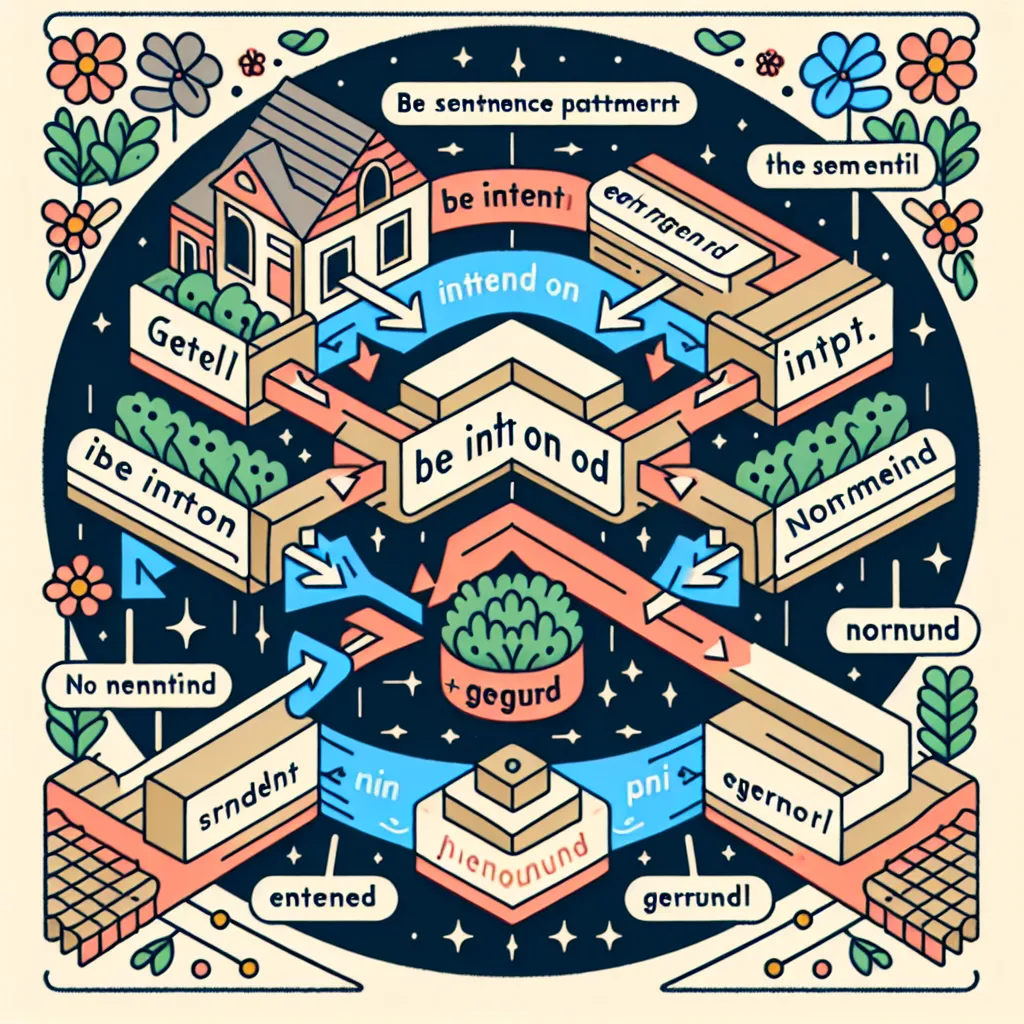The phrase “be intent on + noun/gerund” is a powerful construction that can elevate your IELTS score when used correctly. This structure appears frequently in both the Reading and Listening sections, and mastering it can significantly improve your Writing and Speaking performance. Let’s dive into the intricacies of this phrase and explore how to use it effectively in your IELTS preparation and exam.
Understanding “Be Intent on + Noun/Gerund”
The phrase “be intent on” expresses a strong determination or focus on achieving something. It’s often followed by a noun or a gerund (verb + -ing form) to indicate the object of one’s intention. This structure is particularly useful in IELTS essays and speaking tasks when discussing goals, ambitions, or determined actions.
Grammatical Structure
The basic structure is:
[Subject] + [be] + intent on + [noun/gerund]
Examples:
- She is intent on winning the competition.
- The government is intent on reducing carbon emissions.
- They are intent on success in their business venture.
In these examples, “winning,” “reducing,” and “success” are the objects of intention, showing what the subjects are determined to achieve.

Using “Be Intent on” in IELTS Writing
Incorporating “be intent on” in your IELTS Writing task can demonstrate a high level of language proficiency. Here are some ways to use it effectively:
Task 2 Essay Introduction
When introducing your essay topic, you can use this phrase to highlight the main focus:
“In recent years, many governments are intent on promoting sustainable development to address environmental concerns.”
Body Paragraphs
Use the phrase to emphasize strong opinions or actions:
“While some corporations are intent on maximizing profits at any cost, others recognize the importance of corporate social responsibility.”
Conclusion
Summarize key points using this structure:
“It is clear that policymakers must be intent on finding a balance between economic growth and environmental protection.”
“Be Intent on” in IELTS Speaking
Using this phrase in your Speaking test can showcase your vocabulary range and grammatical accuracy. Here are some examples:
Part 1: Personal Questions
Examiner: “What are your plans for the future?”
You: “I am intent on pursuing a career in environmental science. I believe it’s crucial to contribute to solving global climate issues.”
Part 2: Cue Card
When describing a goal or ambition:
“I’m going to talk about a personal goal. I am intent on learning a new language by the end of this year. I’ve always been fascinated by…”
Part 3: Discussion
When discussing broader topics:
“Many young people today are intent on creating a work-life balance, which is quite different from previous generations.”
Enhancing Your Score with “Be Intent on”
To achieve a higher band score in IELTS, it’s essential to use complex structures accurately and appropriately. Here’s how “be intent on” can help you reach different band scores:
Band 6-6.5
At this level, you can use the phrase in its basic form:
“The company is intent on expanding its market share.”
Band 7-7.5
Demonstrate more complex usage by combining it with other structures:
“Despite facing numerous challenges, the organization remains intent on implementing innovative solutions to improve customer satisfaction.”
Band 8-9
Show advanced mastery by using the phrase in varied contexts and with sophisticated vocabulary:
“Cognizant of the rapidly evolving digital landscape, forward-thinking businesses are increasingly intent on harnessing cutting-edge technologies to gain a competitive edge in the global marketplace.”
Common Mistakes to Avoid
When using “be intent on,” be careful to avoid these common errors:
-
Incorrect verb form:
- Incorrect: “She is intent on to win the race.”
- Correct: “She is intent on winning the race.”
-
Confusing with similar phrases:
- Incorrect: “They are intent in achieving their goals.”
- Correct: “They are intent on achieving their goals.”
-
Overuse:
- While it’s a powerful phrase, using it too frequently can make your writing seem repetitive. Vary your language with synonymous expressions like “determined to,” “focused on,” or “committed to.”
Conclusion
Mastering the use of “be intent on + noun/gerund” can significantly enhance your IELTS performance across all sections. By incorporating this phrase accurately and appropriately in your writing and speaking, you demonstrate a high level of English proficiency. Remember to practice using it in various contexts and combine it with other complex structures to achieve the best results in your IELTS exam.
To further improve your grasp of similar constructions, you might want to explore related phrases such as “be consistent with + noun/gerund” or “be bent on + noun/gerund”. These additional structures can provide you with a wider range of expressions to use in your IELTS tasks, helping you to express determination and focus in diverse ways.